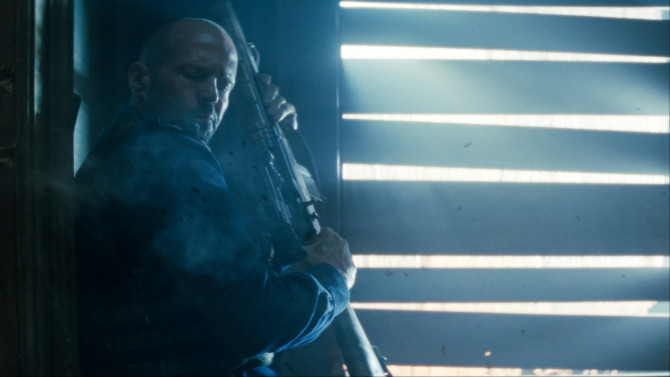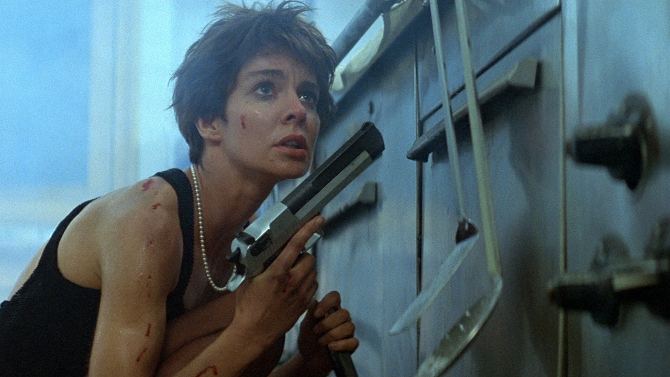
They Call Him the Working Man
Re-teaming together in short order after the success of 2024's The Beekeeper, director David Ayer and star Jason Statham return just one year later with A Working Man (2025)... if the former oozed an unbeatable action hero more along the lines of a John Wick, this newer effort clearly takes some inspiration from the Taken model of hustle and bustle. Actually taking its genesis from a 2014 Chuck Dixon novel entitled “Levon’s Trade”, it was Sylvester Stallone who snapped up its rights... originally adapting it for television through his Balboa Productions. Long story short, it was adjusted to become a movie, Stallone stepped away from starring in it (due to age constraints and a busy schedule with his series Tulsa King), with Ayer soon joining the production, making some additions to the script before directing.
-

Going Rogue
Mission: Impossible - Rogue NationJuly 27, 2018I’ve said it once, and I’ll say it again. . . Tom Cruise is the reincarnation of several silent film stars. Think Buster Keaton – the man willing to jump, fall, slide and put his life on the line for his beloved fans (the front of a house almost crushing him – miraculously finding his way through the upstairs window thanks to a perfectly placed nail on the ground). . . or Harold Lloyd, dangling from a breaking clock eight stories high. . . also Douglas Fairbanks Sr., who we see falling down a ship’s sail with only his dagger jammed into the fabric to control the drop. . . as well as the countless gags performed by the magical Charlie Chaplin. With Mission: Impossible – Fallout being released today (the sixth film in the jaw dropping franchise, I thought it would be a prudent idea to revisit the 2015 fifth feature, Mission: Impossible – Rogue Nation). Opening with a death-defying stunt which has Ethan Hunt (Tom Cruise) dangling from the exterior of a plane taking off, it is a perfect example of what I am taking about above. Completely real, you are actually seeing the actor take off (it took eight tries to get everything perfect), and, each time they reached an incredible five thousand feet. He had to wear special contact lenses, as a speck of dust in the eye would have blinded him, whilst also helping him keep his eyes open.
-

Odds Against You? Need Help?
The EqualizerJuly 20, 2018With its sequel being released today, I thought this was the perfect time to look back at 2014's The Equalizer – the first time the director/actor duo of Antoine Fuqua and Denzel Washington re-teamed since their impressive 2001 effort Training Day (they have since filmed The Magnificent Seven and The Equalizer 2 together). Loosely based upon the 1980s television series of the same name (starring Edward Woodward), Denzel Washington steps into the role of Robert McCall. . . a lonely, quiet and highly OCD man living in Boston. . . who is clearly low on sleep – as he spends his evenings at an all-night diner reading classic literature. During his days, he works at a big box hardware store, a semblance of a bland, repetitive life (his mind often lingers on the past, a complicated history of regret and loss). . . his fellow employees constantly guess what his former job was. . . McCall claims he was a former Pip (as in Gladys Knight & The Pips), showing off his dance moves as the much younger employees look up the reference.
-

Dawn of the Deadpool
Deadpool 2May 20, 2018The anticipation was palpable. . . after a bunch of unique trailers (Superman phone booth spoof, deceased PBS artist Bob Ross riff, ‘oh shit, we forget to put the computer generated effects in’, and apologies to David Beckham), Deadpool has finally returned to theatres – one of the most anticipated R-rated sequels in quite some time. And, for the most part, it thrives. This time directed by stunt man turned action maestro David Leitch (John Wick; Atomic Blonde), he reintroduces us to Wade Wilson, aka Deadpool (Ryan Reynolds), the sarcastic, fast-talking quasi hero who cleans up the streets by leaving one dead body after another littering them. Though all is not well, and we soon flash back to learn why our protagonist is so morose – a nice touch, while he sulks, he plays a music box that features Wolverine impaled on a stake. *** Warning, one major and a few minor spoilers in the upcoming paragraphs.***
-

Pork-Chop Suey
Big Trouble in Little ChinaMay 15, 2018One of the great anti-heros of the 1980's, Kurt Russell’s Snake Plissken (John Carpenter’s Escape From New York) is a quick-thinking cynic; a cool, level-headed former Special Forces military man with a plan. . . and let’s face it, his combination of quick wit and eye patch makes him one bad-ass muthafuka. Quite the opposite, Jack Burton (also played by Russell), with his diction having a John Wayne tinge, is a cocky, brash American, a fly-by-the-seat-of-his-pants ‘in his own mind’ leader who lacks the brains, the skills or the know how to be in that all-important position. The main protagonist of John Carpenter’s 1986 fantastical martial arts action/adventure/comedy Big Trouble in Little China, Burton is a truck driver (his big rig named The Pork-Chop Express), spending those long days and even longer nights spouting his unique brand of advice to whoever is listening on their CB – a prime example, “when some wide-eyed, eight-foot-tall maniac grabs your neck, taps the back of your favorite head up against the barroom wall, and he looks you crooked in the eye and he asks if ya paid your dues, you just stare that big sucker right back in the eye, and you remember what ol’ Jack Burton always says at a time like that: ‘Have you paid your dues, Jack?’ ‘Yessir, the check is in the mail’”.
-

Vive La Femme. . . Nikita
La Femme NikitaApril 10, 2018A rare example of a movie that is less known than (most of) its remakes, Luc Besson’s Nikita (also known as La Femme Nikita), released in 1990, has spawned an American big screen adaptation (1993's Point of No Return, starring Bridget Fonda and Gabriel Byrne), as well as two popular television series: Joel Surnow’s show, centred around Peta Wilson, ran for five seasons starting in 1997; while another version began airing on The CW in 2010, lasting four years, with the heroine this time brought to life by Maggie Q. The only version, hinted at above, that is lesser known than the original feature is a 1991 Hong Kong action remake titled Black Cat. An influential French/Italian co-production from one of the modern masters of action (think Léon: The Professional, The Fifth Element, and Taken – which he wrote and produced), Besson transports us into a strange world, feeling almost dystopic, with a Mad Max-of-the-city type feel. In this landscape we find four hoodlums walking the streets, breaking into a drug store to feed their drug fix. Challenged by a brave store owner (who lives above the shop) and the heavily armed police, the only one of the quartet left alive is Nikita (Anne Parillaud), a wild card punk – she is a violent junkie sociopath with the ear biting skills of Mike Tyson and the unflappable hand of a master marksman.
-

When You Death Wish Upon a Star
Death WishMarch 6, 2018With a remake currently in theatres, it is the perfect time to revisit 1974's Death Wish. A film that was mostly panned by critics upon its release (a rare supporter was Roger Ebert), its raw form of vigilante justice captured the imagination of the American public – after all, it was an era when crime ran rampant in many urban metropolises. A pure example of a gritty, violent, anti-establishment exploitation piece, director Michael Winner (The Mechanic) introduces us to an architect named Paul Kersey (Charles Bronson – his star raised by this game-changing role), a happy man who is currently on vacation (in Hawaii) with his wife Joanna (Hope Lange).
